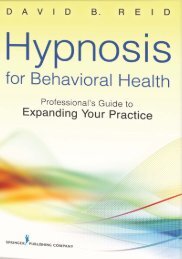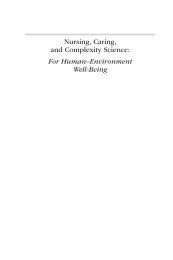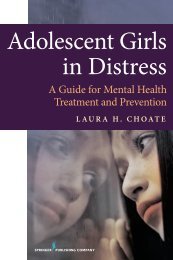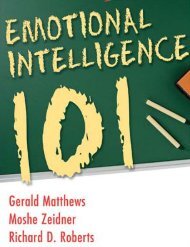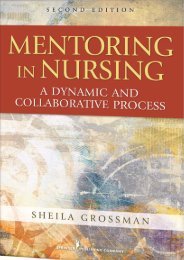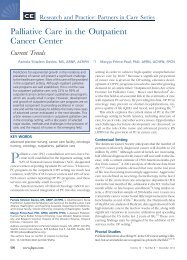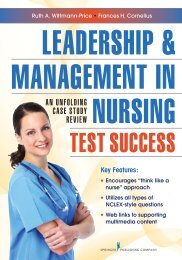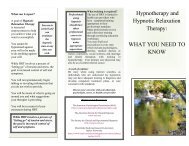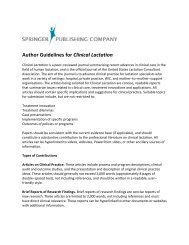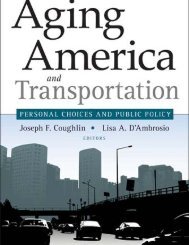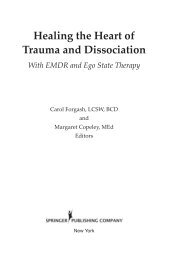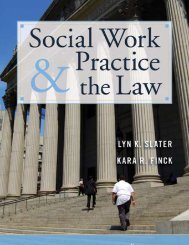Expertise in nursing practice : caring, clinical judgment - Springer ...
Expertise in nursing practice : caring, clinical judgment - Springer ...
Expertise in nursing practice : caring, clinical judgment - Springer ...
You also want an ePaper? Increase the reach of your titles
YUMPU automatically turns print PDFs into web optimized ePapers that Google loves.
10 <strong>Expertise</strong> <strong>in</strong> Nurs<strong>in</strong>g Practice<br />
recognize without benefit of experience. The beg<strong>in</strong>neristhen given rules<br />
for determ<strong>in</strong><strong>in</strong>g actions on the basis of these features, like a computer<br />
follow<strong>in</strong>g a program. Through <strong>in</strong>struction, the novice acquires rules for<br />
draw<strong>in</strong>g conclusions or for determ<strong>in</strong><strong>in</strong>g actions based upon facts and<br />
features of the situation that are recognizable without experience <strong>in</strong> the<br />
skill doma<strong>in</strong> be<strong>in</strong>g learned. These elements are either objective ones,<br />
such as <strong>in</strong>strument read<strong>in</strong>gs,or subjectiveones,ofwhichthe novice can<br />
reasonably be expected to have acquired arecognition ability based on<br />
prior experience <strong>in</strong> other doma<strong>in</strong>s. For example, any adult beg<strong>in</strong>n<strong>in</strong>g<br />
nurs<strong>in</strong>g school can identify a state ofhigh agitation, even though no<br />
formula applied toobjective features such asheart rate can consistently<br />
do this job.<br />
The knowledge impartedto the novice is what we havecalled theoretical<br />
knowledge, yet,even at this first level, it can requirefor its application<br />
assessments, such as that of extreme agitation, that admit of no theoretical<br />
description. We have already, at this <strong>in</strong>itial stage, an example ofthe<br />
superiority of comb<strong>in</strong><strong>in</strong>g theory and experience-taught capabilities.<br />
To make our skill description more accessible, we will illustrate our<br />
dist<strong>in</strong>ctions with examples chosen from automobile driv<strong>in</strong>g, as almost<br />
all readers have acquired this skill. In later chapters, us<strong>in</strong>g actual words<br />
of nurses aswell as descriptions of their behavior, we will follow the<br />
skill-acquisition process as it relates to nurs<strong>in</strong>g.<br />
Along with many other rules, the novice driverisgivenaformula for<br />
the safe distance at whichtofollowanother car as a function of objectively<br />
determ<strong>in</strong>edspeed as <strong>in</strong>dicatedbythe speedometer. Of course, the novice<br />
is nottold howto recognize a car as opposedto an elephant (whichprobably<br />
should not befollowed asclosely), s<strong>in</strong>ce this ability is assumed to<br />
have been already acquired. Interest<strong>in</strong>gly, no strict rules haveeverbeen<br />
found that would allow acomputer, us<strong>in</strong>g only objective data such asa<br />
digitized video image, toconsistently and correctly dist<strong>in</strong>guish a member<br />
of theclass of cars from all other objects, demonstrat<strong>in</strong>g the <strong>in</strong>adequacy<br />
of depend<strong>in</strong>g upontheory alone. Itseems that our car-recognition ability<br />
comes from experience through a bra<strong>in</strong>-modificationprocess that neurophysiologists<br />
and mathematicians study<strong>in</strong>g artificial neural networks are<br />
beg<strong>in</strong>n<strong>in</strong>g to understand <strong>in</strong> terms of synaptic re<strong>in</strong>forcement and <strong>in</strong>hibition<br />
based on outcomes of behaviors. The ability to discrim<strong>in</strong>ate between<br />
different sensory <strong>in</strong>puts and to learn to respond differently to different<br />
classes of <strong>in</strong>put almost certa<strong>in</strong>ly doesnotdepend on rules and pr<strong>in</strong>ciples,<br />
evenunconscious ones,ofthe type givennovices dur<strong>in</strong>g their theoretical<br />
tra<strong>in</strong><strong>in</strong>g.



